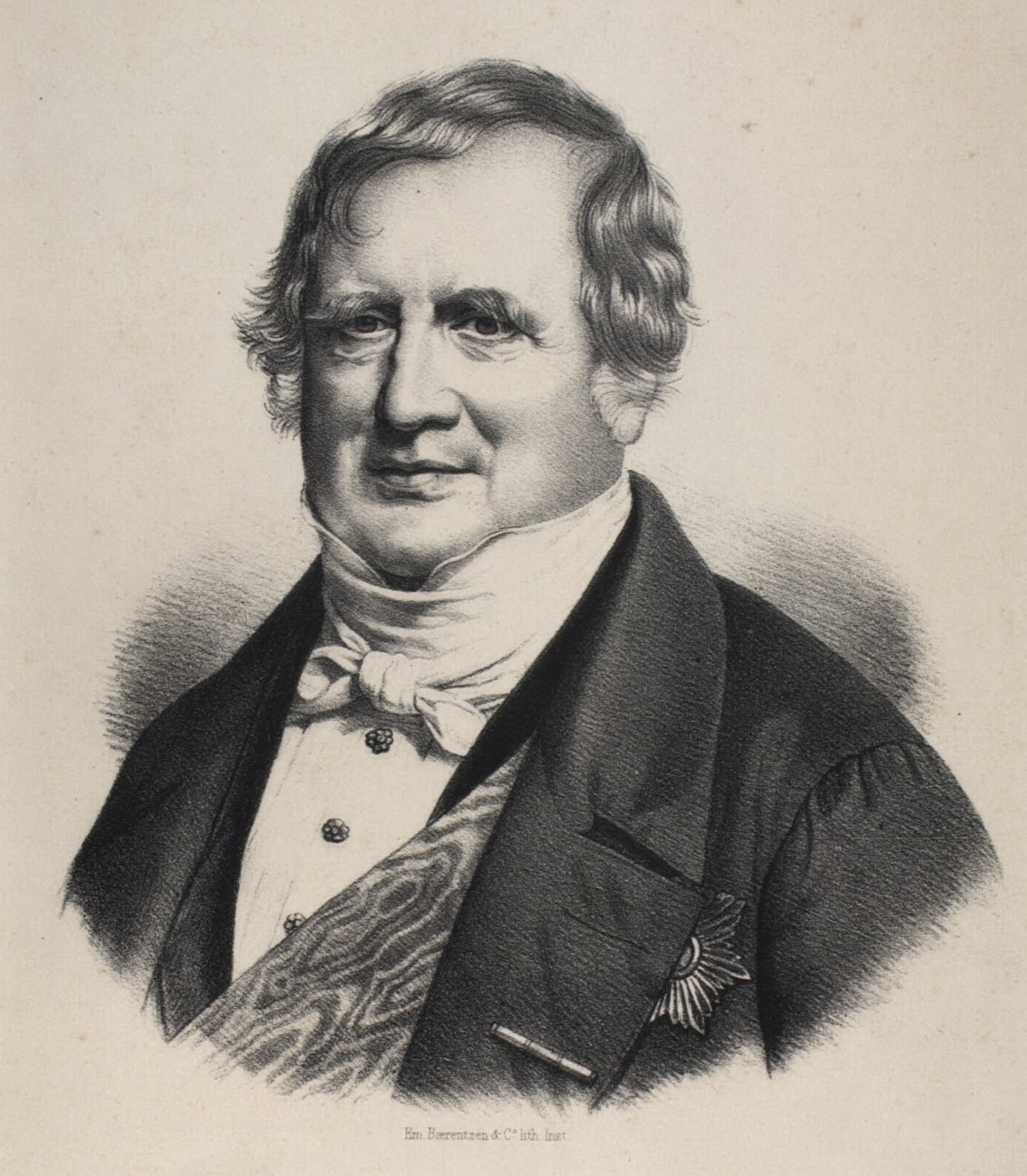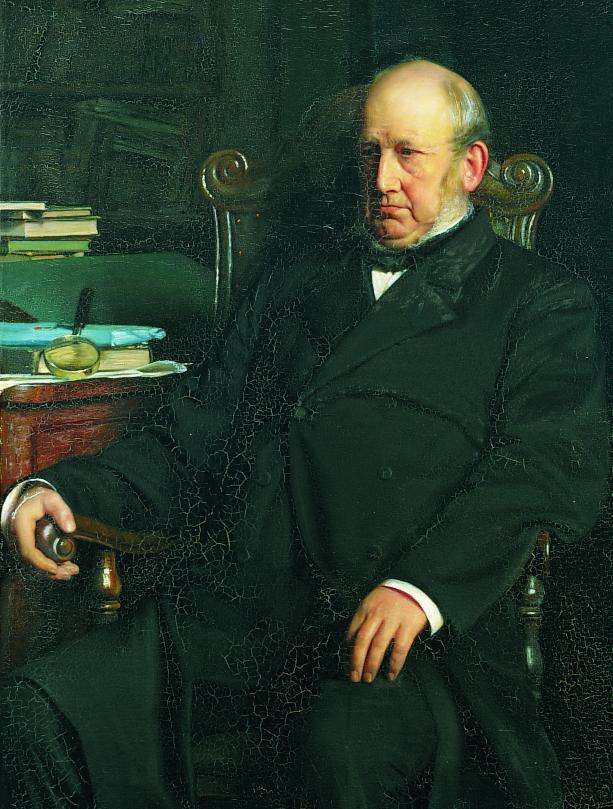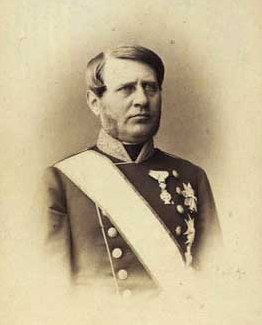|
Carl Christoffer Georg Andræ
Carl Christopher Georg Andræ (14 October 1812 – 2 February 1893) was a Danish politician and mathematician. From 1842 until 1854, he was professor of mathematics and mechanics at the national military college. He was elected to the Royal Danish Academy of Sciences and Letters in 1853. Andræ was by royal appointment a member of the 1848 Danish Constituent Assembly. In 1854, he became Finance Minister in the Cabinet of Bang before also becoming Council President of Denmark 1856-1857 as leader of the Cabinet of Andræ. After being replaced as Council President by Carl Christian Hall in 1857 Andræ continued as Finance Minister in the Cabinet of Hall I until 1858. Being an individualist he, after the defeat of the National Liberals, never formally joined any political group but remained for the rest of his life a sceptical de facto conservative spectator of the 'Constitutional Struggle'. Early life and education Andræ was born in Hjertebjerg Rectory on the island of Møn ... [...More Info...] [...Related Items...] OR: [Wikipedia] [Google] [Baidu] |
Prime Minister Of Denmark
The prime minister of Denmark (, , ) is the head of government in the Kingdom of Denmark comprising the three constituent countries: Denmark, Greenland and the Faroe Islands. Before the creation of the modern office, the kingdom did not initially have a head of government separate from its head of state, namely the monarch, in whom the executive authority was vested. The Constitution of 1849 established a constitutional monarchy by limiting the powers of the monarch and creating the office of . The inaugural holder of the office was Adam Wilhelm Moltke. The prime minister presides over a cabinet that is formally appointed by the monarch. In practice, the appointment of the prime minister is determined by their support in the Folketing (the National Parliament). Since the beginning of the 20th century, no single party has held a majority in the Folketing so the prime minister must head a coalition of political parties, as well as their own party. Additionally, only four ... [...More Info...] [...Related Items...] OR: [Wikipedia] [Google] [Baidu] |
Single Transferable Vote
The single transferable vote (STV) or proportional-ranked choice voting (P-RCV) is a multi-winner electoral system in which each voter casts a single vote in the form of a ranked ballot. Voters have the option to rank candidates, and their vote may be transferred according to alternative preferences if their preferred candidate is eliminated or elected with surplus votes, so that their vote is used to elect someone they prefer over others in the running. STV aims to approach proportional representation based on votes cast in the district where it is used, so that each vote is worth about the same as another. STV is a family of multi-winner proportional representation electoral systems. The proportionality of its results and the proportion of votes actually used to elect someone are equivalent to those produced by proportional representation election systems based on lists. STV systems can be thought of as a variation on the largest remainders method that uses candidate-based so ... [...More Info...] [...Related Items...] OR: [Wikipedia] [Google] [Baidu] |
1893 Deaths
Events January * January 2 – Webb C. Ball introduces railroad chronometers, which become the general railroad timepiece standards in North America. * January 6 – The Washington National Cathedral is chartered by Congress; the charter is signed by President Benjamin Harrison. * January 13 ** The Independent Labour Party of the United Kingdom has its first meeting. ** U.S. Marines from the ''USS Boston'' land in Honolulu, Hawaii, to prevent the queen from abrogating the Bayonet Constitution. * January 15 – The ''Telefon Hírmondó'' service starts with around 60 subscribers, in Budapest. * January 17 – Overthrow of the Kingdom of Hawaii: Lorrin A. Thurston and the Committee of Safety (Hawaii), Citizen's Committee of Public Safety in Hawaii, with the intervention of the United States Marine Corps, overthrow the government of Queen Liliuokalani. * January 21 – The Tati Concessions Land, formerly part of Matabeleland, is formally annexed to the Bec ... [...More Info...] [...Related Items...] OR: [Wikipedia] [Google] [Baidu] |
1812 Births
Events January–March * January 1 – The ''Allgemeines bürgerliches Gesetzbuch'' (the Austrian civil code) enters into force in the Austrian Empire. * January 19 – Peninsular War: The French-held fortress of Ciudad Rodrigo Siege of Ciudad Rodrigo (1812), is stormed by the Anglo-Portuguese Army, under the Arthur Wellesley, 1st Duke of Wellington, Earl of Wellington. * February 7 – The last 1811–12 New Madrid earthquakes, New Madrid earthquake strikes New Madrid, Missouri, with an estimated moment magnitude scale, moment magnitude of over 8. * February 12 – Napoleon authorizes the usage of ''Mesures usuelles'', the basis of the metric system. * February 13 – The first Chilean newspaper ''Aurora de Chile'' deals with political philosophy, and stands in favor of the new national government. * February 27 ** Argentine War of Independence: Manuel Belgrano raises the Flag of Argentina (which he designed) in the city of Rosario, for the first time. ** English poet ... [...More Info...] [...Related Items...] OR: [Wikipedia] [Google] [Baidu] |
List Of Prime Ministers Of Denmark
The Prime Minister of Denmark is the head of government of the Danish Realm, Kingdom of Denmark and leader of the Cabinet of Denmark, Cabinet. The Prime Minister is formally appointed by the Monarch, who is head of state. The first four heads of government were titled (), between 1855 and 1920 the title was (). Since 1920, the title has been (). Denmark's current prime minister is Mette Frederiksen representing the Social democracy, social democratic party Social Democrats (Denmark), Social Democrats. Mette Frederiksen took office on 27 June 2019, taking over the position from Lars Løkke Rasmussen, representing the Liberalism, liberal party . Frederiksen is also the second female prime minister in the history of the country, after fellow socialist party colleague Helle Thorning-Schmidt who served from 2011 to 2015. List of prime ministers (1848–1855) List of council presidents (1855–1918) List of prime ministers (1918–present) Timeline (1848–present) This ... [...More Info...] [...Related Items...] OR: [Wikipedia] [Google] [Baidu] |
Andreas Frederik Krieger
Andreas Frederik Krieger (4 October 1817, Kolbjørnsvik – 27 September 1893) was a Danish politician, government minister, professor of law and supreme court judge. He was a member of the National Constitutional Assembly from 1848 to 1849, a member of the Folketing from 1849 to 1852 representing the National Liberal Party and a member of the Landsting from 1863 to 1890 representing first the National Liberal Party and later the conservative party Højre. Background and legal career Andreas Frederik Krieger was born in 1817 in Kolbjørnsvik in Norway as the son of Danish naval officer Johannes Krieger, who was of an ennobled family, and a Norwegian mother, Anna Elisa Finne. Krieger grew up in Copenhagen and graduated from the University of Copenhagen with a legal degree at the age of 20, specializing in constitutional law. From 1845 to 1855 he was a professor of law at the University of Copenhagen, lecturing primarily in civil law. Political career Krieger was electe ... [...More Info...] [...Related Items...] OR: [Wikipedia] [Google] [Baidu] |
Wilhelm Sponneck
Wilhelm Carl Eppingen Sponneck (16 February 1815 – 29 February 1888) was a Denmark, Danish nobleman (''rigsgreve'') and Minister of Finance of Denmark, Minister of Finance. He was influential in Danish customs affairs for several years. Early life and education Wilhelm Carl Eppingen Sponneck was born in Ringkøbing in 1815. He graduated from Sorø Academy in 1832, and entered into a study of the law. He received a law degree in 1836. Career He was employed in the Danish customs service and rose to a leading position in the 1840s after publishing a 600-page work about customs services. King Frederick VII of Denmark appointed him to the Constitution of Denmark, Constitutional Assembly in 1848. Also in 1848 he was appointed Minister of Finance of Denmark, Finance Minister, an office which he occupied in a total of five cabinets. He was first a supporter of the Unitary State with Holstein, but during the First War of Schleswig he switched to a pro-Danish policy, and in 1850 he ... [...More Info...] [...Related Items...] OR: [Wikipedia] [Google] [Baidu] |
List Of Finance Ministers Of Denmark
This is a list of finance ministers of Denmark since Denmark's first unified finance ministry was established in 1848. List of finance ministers (1848–present) Ministers under Frederick VII (1848–1863) Ministers under Christian IX (1863–1906) Ministers under Frederik VIII (1906–1912) Ministers under Christian X (1912–1947) ! colspan=8, 29 August 1943 – 5 May 1945 Ministers under Frederik IX (1947–1972) Ministers under Margrethe II (1972–present) References BibliographyThe Danish Finance Ministry [...More Info...] [...Related Items...] OR: [Wikipedia] [Google] [Baidu] |
Johan Nicolai Madvig
Johan Nicolai Madvig (; 7 August 1804 – 12 December 1886), was a Danish philologist and Kultus Minister. Life Madvig was born on the Danish island of Bornholm, south of Sweden. He was educated at the classical school of Frederiksborg and the University of Copenhagen, at least partially on the cost of Marie Kofoed. In 1828 he became reader, and in 1829 professor of Latin language and literature at Copenhagen, and in 1832 was appointed university librarian. In 1848, Madvig entered parliament as a member of the "Eider-Danish" part—those who desired the Eider to be the boundary of the country. When this party came into power Madvig became Kultus Minister in the Cabinet of Moltke II and III, but left the cabinet on 7 December 1851 as a protest against the government's unity state program. In 1852 he became director of public instruction. Some years later, from 1856 to 1863, Madvig was president of the Danish parliament and leader of the National Liberal Party. With these br ... [...More Info...] [...Related Items...] OR: [Wikipedia] [Google] [Baidu] |
Folketing
The Folketing ( , ), also known as the Parliament of Denmark or the Danish Parliament in English, is the unicameral national legislature (parliament) of the Kingdom of Denmark — Denmark proper together with the Faroe Islands and Greenland. Established in 1849, the Folketing was the lower house of the bicameral parliament called the Rigsdag until 1953; the upper house was the Landsting. The Folketing meets in Christiansborg Palace, on the islet of Slotsholmen in central Copenhagen. It passes all laws, approves the cabinet, and supervises the work of the government. It is also responsible for adopting the state's budgets and approving the state's accounts. As set out in the Constitution of Denmark, the Folketing shares power with the reigning monarch. But in practice, the monarch's role is limited to signing laws passed by the legislature; this must be done within 30 days of adoption. The Folketing consists of 179 members; including two from Greenland and two from the ... [...More Info...] [...Related Items...] OR: [Wikipedia] [Google] [Baidu] |
Project Runeberg
Project Runeberg () is a digital cultural archive initiative that publishes free electronic versions of books significant to the culture and history of the Nordic countries. Patterned after Project Gutenberg, it was founded by Lars Aronsson and colleagues at Linköping University and began archiving Nordic-language literature in December 1992. As of 2015 it had accomplished digitization to provide graphical facsimiles of old works such as the ''Nordisk familjebok'', and had accomplished, in whole or in part, the text extractions and copyediting of these as well as esteemed Latin works and English translations from Nordic authors, and sheet music and other texts of cultural interest. Nature and history Project Runeberg is a digital cultural archive initiative patterned after the English-language cultural initiative, Project Gutenberg; it was founded by Lars Aronsson and colleagues at Linköping University, especially within the university group Lysator (see below), with the aim ... [...More Info...] [...Related Items...] OR: [Wikipedia] [Google] [Baidu] |
Zentralblatt MATH
zbMATH Open, formerly Zentralblatt MATH, is a major reviewing service providing reviews and abstracts for articles in pure and applied mathematics, produced by the Berlin office of FIZ Karlsruhe – Leibniz Institute for Information Infrastructure GmbH. Editors are the European Mathematical Society, FIZ Karlsruhe, and the Heidelberg Academy of Sciences. zbMATH is distributed by Springer Science+Business Media. It uses the Mathematics Subject Classification codes for organising reviews by topic. History Mathematicians Richard Courant, Otto Neugebauer, and Harald Bohr, together with the publisher Ferdinand Springer, took the initiative for a new mathematical reviewing journal. Harald Bohr worked in Copenhagen. Courant and Neugebauer were professors at the University of Göttingen. At that time, Göttingen was considered one of the central places for mathematical research, having appointed mathematicians like David Hilbert, Hermann Minkowski, Carl Runge, and Felix Klein ... [...More Info...] [...Related Items...] OR: [Wikipedia] [Google] [Baidu] |




